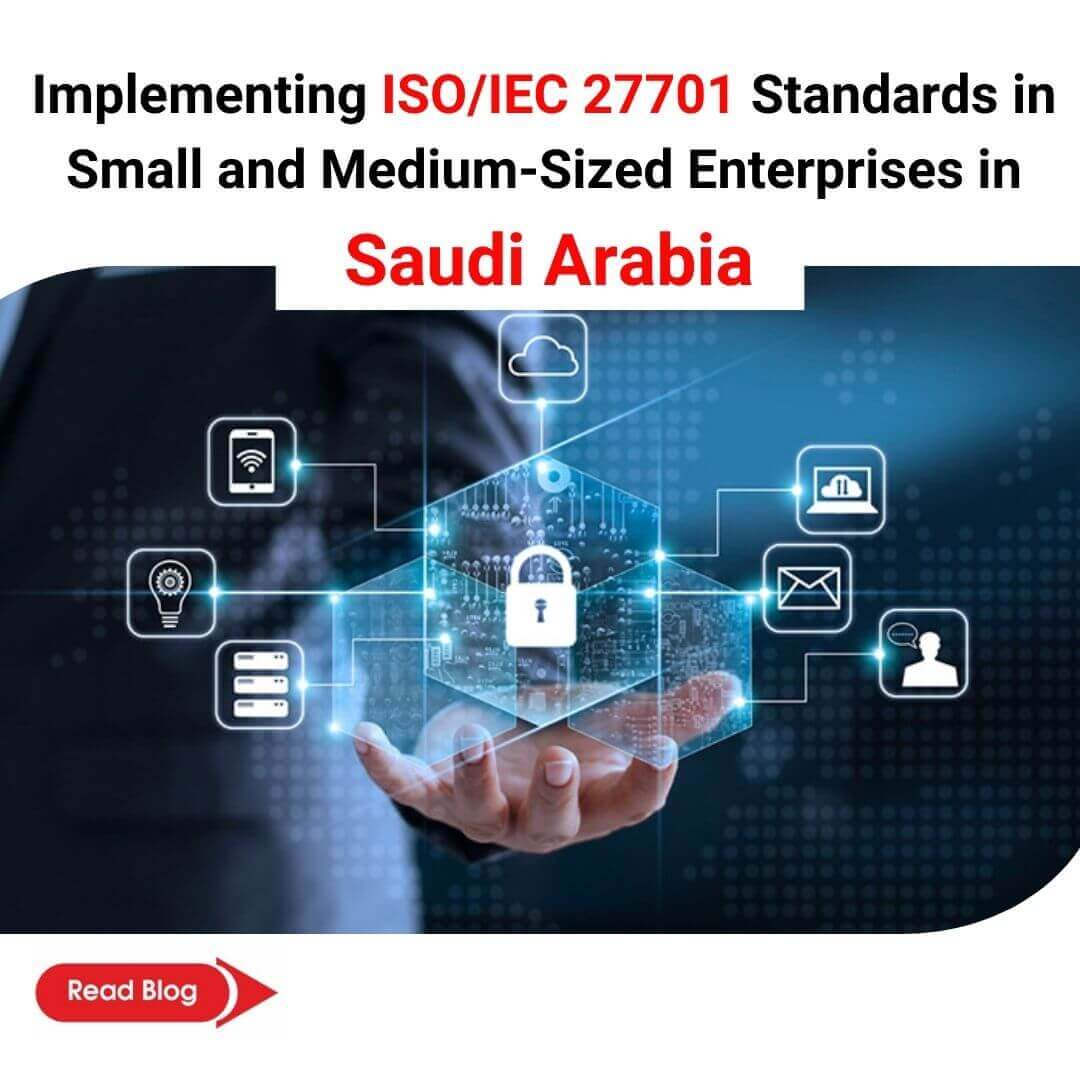Introduction
As Saudi Arabia pursues its ambitious digital transformation under Vision 2030, the significance of protecting personal data has never been paramount. As organizations increasingly rely on digital technology, the dangers of data breaches and cyber-attacks have grown. Navigating Saudi Arabia’s complicated terrain may be especially difficult for small and medium-sized firms (SMEs). Implementing ISO/IEC 27701 Privacy Information Management System (PIMS), an extension of the internationally renowned ISO/IEC 27701 standard, creates a strong foundation for protecting personal data protection. This article digs into the advantages, obstacles, and implementation techniques of ISO/IEC 27701 for Saudi SMEs, providing actionable ideas for improving data privacy policies.
The Growing Need for Data Privacy in Saudi Arabia
Saudi Arabia’s Vision 2030 is propelling essential technological and digital breakthroughs across a wide range of sectors. While the digital transformation has many advantages, it also raises serious issues about data security and privacy. The growing volume of personal data gathered, processed, and kept by corporations raises the danger of data breaches, identity theft, and cyber assaults.
To address these concerns, the Saudi government enacted the Personal Data Protection Law (PDPL), which sets strict criteria for data management and protection. Compliance with the PDPL is critical for firms seeking to avoid legal ramifications and retain consumer trust. Adopting a comprehensive privacy management framework like ISO/IEC 27701 may be transformative for SMEs, who frequently face resource restrictions and insufficient expertise.
What is ISO/IEC 27701:2019?
is an international standard ISO/IEC 27701:2019 Privacy Information Management System (PIMS) that builds upon ISO 27001, which focuses on information security management. While ISO 27001 offers a framework for managing information security risks, ISO/IEC 27701 extends privacy management by addressing personal data protection.
ISO/IEC 27701 :2019 Privacy Information Management System (PIMS) assists businesses in developing, implementing, maintaining, and constantly improving a Privacy Information Management System (PIMS). It outlines standards for managing personal data (Personally Identifiable Information, or PII) in accordance with both global best practices and local requirements. By incorporating ISO/IEC 27701 into their operations, small and medium-sized enterprises SMEs may improve their data privacy procedures and manage privacy concerns.
Key Benefits of ISO/IEC 27701 Privacy Information Management System (PIMS) for SMEs in Saudi Arabia
- Regulatory Compliance
Companies must ensure that they abide by local laws like the Personal Data Protection Law PDPL to ensure they do not end up in legal cases and consequences. ISO/IEC 27701:2019 enables SMEs to bring their data protection into conformity with these regulations and thus avoid hefty fines. Through compliance to ISO/IEC 27701, a firm can prove its conformity to data privacy and put a satisfactory safety check against regulatory non-compliance.
- Enhanced Data Protection
ISO/IEC 27701:2019 can thus be used as a framework, giving an organized process of dealing with personal data privacy. What is even stipulated in the standard relates to controls and procedures to facilitate the identification, evaluation, and management of privacy risks. If implemented, SMEs can enhance their position concerning data protection, personal data security, and the overall risk of data breaches and cyberattacks.
- Building Customer Trust
All businesses require trust especially where they conduct their operations in the digital platform to enhance data protection. This means that obtaining ISO/IEC 27701 certification makes a statement to customers, partners, and stakeholders that your business respects data privacy. It can also help to bolster your organisation’s image, reassure customers and help consumers to distinguish between businesses.
- Global Recognition
ISO/IEC 27701 Privacy Information Management System (PIMS) is an international standard. Having this certification can help an SME to build a better image for its organization and this will help it to easily penetrate the international markets. Insofar as the Saudi companies aim at expanding their operations beyond the KSA borders, the ISO/IEC 27701 certification will give them a competitive edge by establishing compliance to global Personal Data Protection Act (PDPA) standards.
- Continuous Improvement
ISO/IEC 27701 ensures constant improvement by having the aspects of review and update of the PIMS as a necessity. This is a continuous process that will guarantee that the SMEs are responsive to the emergent threats in privacy, alteration of laws as well as changes in the benchmark practices. Keeping data constantly up to date assists the businesses to avoid being caught up with certain risks while at the same time practicing sufficient measures in data privacy.
Challenges of Implementing ISO/IEC 27701 Privacy Information Management System (PIMS)
Even though ISO/IEC 27701 has several advantages, SMEs in particular may find the implementation process difficult. Typical difficulties include the following:
- Resource Limitations –
It takes a substantial time, financial, and professional commitment to implement ISO/IEC 27701 . It might be difficult for SMEs to set aside the funds required for continuous maintenance, system updates, training, and documentation. This can be especially difficult for smaller companies that have tighter resources and fewer employees.
- Knowledge Deficits
SMEs might not have the internal knowledge necessary to handle the complexities of ISO/IEC 27701 as privacy management is a complicated topic. This may make it more difficult to comply with regulations and properly manage privacy issues. It can be necessary for SMEs to look for outside consultants or training to fill up these knowledge gaps.
- Resistance Inside the Organization
Successful implementation may encounter obstacles related to change management. New privacy policies may be opposed by staff members and management, particularly if they seem burdensome or superfluous to them. Getting support from all organizational levels is essential to getting over opposition and guaranteeing a seamless implementation process.
- Continued Maintenance
ISO/IEC 27701 is a continuous endeavor rather than a one-time undertaking. SMEs must keep an eye on, evaluate, and update their Privacy Information Management System on a regular basis. To guarantee sustained compliance and efficacy, this continual maintenance can be resource-intensive and needs constant attention.
Success Story
Success story of SMEs in Saudi Arabia that have effectively adopted ISO/IEC 27701. These real-world examples demonstrate that this standard may help businesses of all sizes.
TechSmart is a small IT services firm situated in Riyadh. They opted to implement ISO/IEC 27701 Privacy Information Management System (PIMS) after losing a prospective client who was concerned about data protection. The procedure took around six months, but the outcome was worthwhile. They not only regained that customer, but they have also witnessed a 30% increase in new business inquiries since acquiring certification.
Conclusion
Implementing ISO/IEC 27701 Privacy Information Management System (PIMS) is a strategic investment for Saudi SMEs, providing a complete framework for data privacy management, regulatory compliance, and consumer confidence. While the process has its hurdles, the benefits—such as improved data security, regulatory alignment, and worldwide recognition—make it worthwhile. Saudi SMEs may successfully negotiate the difficulties of data protection and maintain their position in the digital economy by adopting a systematic approach, involving stakeholders, and committing to continuous development. Embracing ISO/IEC 27701 not only assists organizations in protecting personal data, but also indicates a commitment to best practices in privacy management, setting the road for long-term success in a competitive market.



